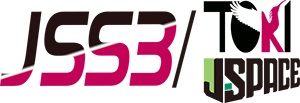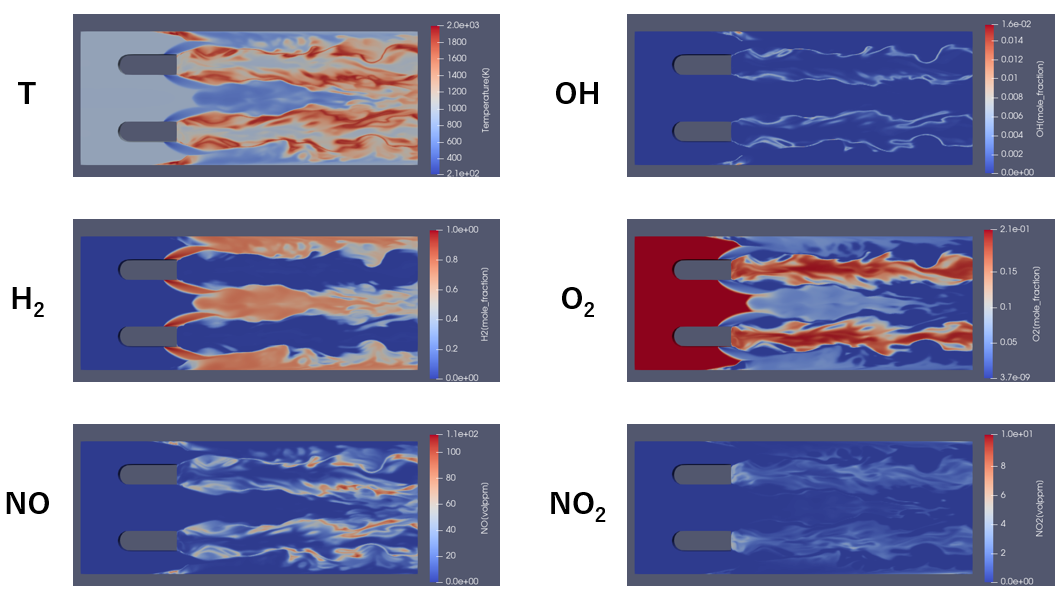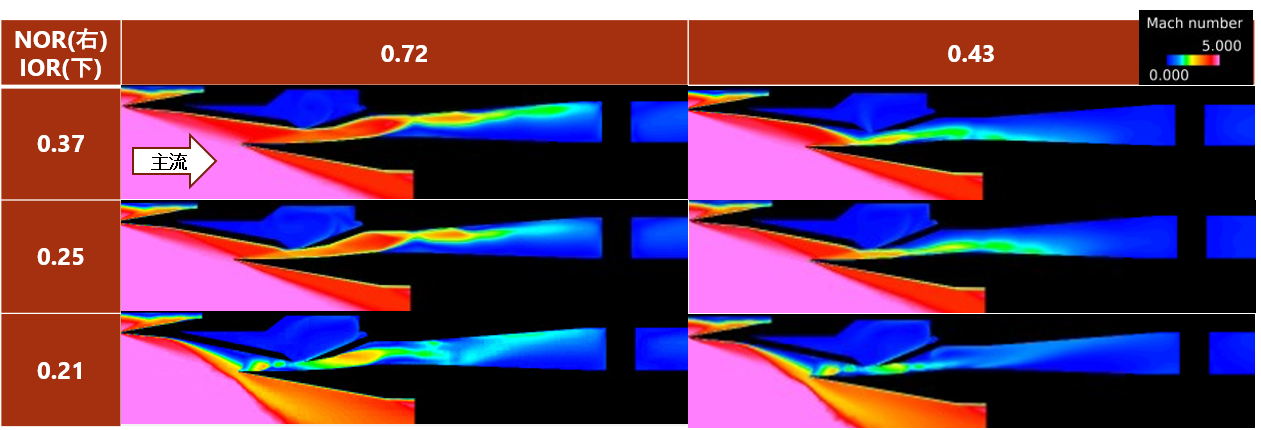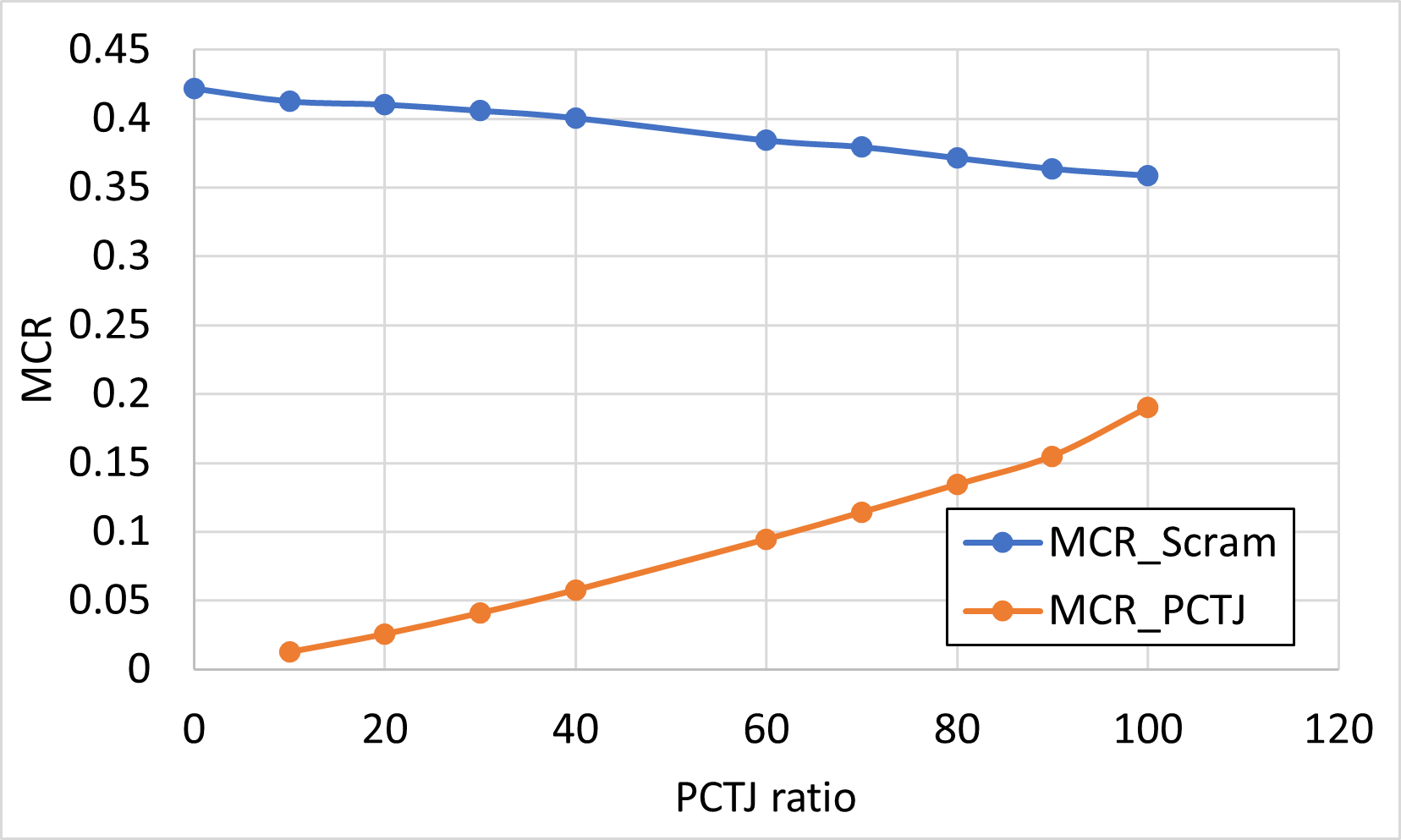Hydrogen Application to Aircraft and Future Space Transportation System
JAXA Supercomputer System Annual Report February 2022-January 2023
Report Number: R22EA2121
Subject Category: Aeronautical Technology
- Responsible Representative: Sadatake Tomioka, Leader, Hydrogen Aerospace Plane Team
- Contact Information: Hideyuki Taguchi(taguchi.hideyuki@jaxa.jp)
- Members: Shima Ariyoshi, Manami Fujii, Motoyuki Hongoh, Yusuke Hoshiya, Daiki Ito, Yuki Kuwabara, Aoto Kikui, Shota Kiuchi, Masafumi Momose, Taisuke Nambu, Koutarou Nakayama, Koichi Omi, Naoyuki Okamura, Junichi Oki, Shunsuke Imamura, Takahiro Terao, Nozomi Takaki, Rintaro Tanaka, Hideyuki Taguchi, Kotaro Yamada
Abstract
This research aims at the demonstration of the thrust control method of a hypersonic pre-cooled turbojet engine using liquid hydrogen fuel and the aircraft / propulsion integrated control method. We acquire the control characteristics of the hypersonic integrated control experimental aircraft to establish the aircraft / propulsion integrated control method taking into account the mutual interference of hypersonic airframe and hypersonic engines. In addition to defining the required specifications of hypersonic aircraft, we present the design specifications of the hypersonic experimental aircraft for carrying out flight demonstration of hypersonic pre-cooled turbojet engine.
Reference URL
N/A
Reasons and benefits of using JAXA Supercomputer System
For reacting flow simulation including NOx, there are many chemical species and calculation cost is high.
We need a long calcularion time to obtain the aerodynamic characteristics of the overall hypersonic experimental aircraft by CFD analyses.
Achievements of the Year
LES of combustion inside the model afterburner of pre-cooled turbojet engine with dual injector. (Fig. 1)
CFD was used to evaluate the aerodynamic characteristics of the High-Mach Integrated Control Experimental Aircraft with a flow-through duct that simulates an air-breathing engine. (Fig. 2)
Acquisition of intake characteristics of ramjet engine for High Mach Integrated Control Experiment (HIMICO) at the mainstream Mach number 5, and CFD analysis for varying intake opening and nozzle opening. (Fig. 3)
The flowfield around the intake during engine switching for TBCC intakes was evaluated by CFD. (Fig. 4)
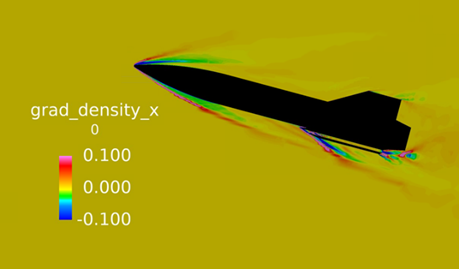
Fig.2: Flow Field around High-Mach Integrated Control Experimental Aircraft (Density gradient distribution, Mach 5.0, Angle of attack: 15deg)
Publications
– Oral Presentations
Takahiro Terao, Tomonari Hirotani, Hideyuki Taguchi, Naoyuki Okamura, Asei Tezuka, Evaluation of Aerodynamic Characteristics of High-Mach Integrated Control Experimental Aircraft (HIMICO) with Flow-through Engine, 60th Aircraft Symposium, 2021.
Yusuke Hoshiya, Manami Fuji, Yuki Fujimori, Yuki Kuwabara, Rintaro Tanaka,
Tetsuya Sato, Hidemi Takahashi, Hideyuki Taguchi, The Developmental Progress of the Supersonic Intake for High Mach Integrated Control Experiment (HIMICO), The 2022 Asia-Pacific International Symposium on Aerospace Technology, 2022
Yusuke Hoshiya, Manami Fuji, Yuki Fujimori, Yuki Kuwabara, Rintaro Tanaka,
Tetsuya Sato, Hidemi Takahashi, Hideyuki Taguchi, Tomonari Hirotani, Experimental/Numerical Research of the Performance at Mach 5 of the Ramjet Intake for High Mach Integrated Control Experiment (HIMICO), 2022 Space Transportation Symposium, 2022
Usage of JSS
Computational Information
- Process Parallelization Methods: MPI
- Thread Parallelization Methods: OpenMP
- Number of Processes: 1 – 2
- Elapsed Time per Case: 30 Hour(s)
JSS3 Resources Used
Fraction of Usage in Total Resources*1(%): 1.33
Details
Please refer to System Configuration of JSS3 for the system configuration and major specifications of JSS3.
| System Name | CPU Resources Used(Core x Hours) | Fraction of Usage*2(%) |
|---|---|---|
| TOKI-SORA | 31567658.83 | 1.38 |
| TOKI-ST | 1173629.29 | 1.17 |
| TOKI-GP | 1828.40 | 0.08 |
| TOKI-XM | 0.00 | 0.00 |
| TOKI-LM | 8861.91 | 0.59 |
| TOKI-TST | 0.00 | 0.00 |
| TOKI-TGP | 0.00 | 0.00 |
| TOKI-TLM | 0.00 | 0.00 |
| File System Name | Storage Assigned(GiB) | Fraction of Usage*2(%) |
|---|---|---|
| /home | 1957.92 | 1.77 |
| /data and /data2 | 158580.00 | 1.22 |
| /ssd | 9550.00 | 1.32 |
| Archiver Name | Storage Used(TiB) | Fraction of Usage*2(%) |
|---|---|---|
| J-SPACE | 13.77 | 0.06 |
*1: Fraction of Usage in Total Resources: Weighted average of three resource types (Computing, File System, and Archiver).
*2: Fraction of Usage:Percentage of usage relative to each resource used in one year.
ISV Software Licenses Used
| ISV Software Licenses Used(Hours) | Fraction of Usage*2(%) | |
|---|---|---|
| ISV Software Licenses(Total) | 4079.73 | 2.84 |
*2: Fraction of Usage:Percentage of usage relative to each resource used in one year.
JAXA Supercomputer System Annual Report February 2022-January 2023

